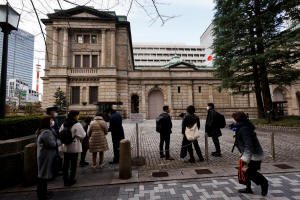BOJ defies market bets for policy tweaks, yen tumbles
 Send a link to a friend
Send a link to a friend
 [January 18, 2023] By
Leika Kihara and Tetsushi Kajimoto [January 18, 2023] By
Leika Kihara and Tetsushi Kajimoto
TOKYO (Reuters) - The Bank of Japan on Wednesday maintained ultra-low
interest rates, including a bond yield cap it was struggling to defend,
defying market expectations it would phase out its massive stimulus
programme amid mounting inflationary pressure.
The surprise decision sent the yen skidding against other currencies and
bond yields tumbling the most in decades, as investors unwound bets they
made anticipating the central bank would overhaul its yield control
policy.
Instead of changing its stimulus programme, the BOJ crafted a new weapon
to prevent long-term rates from rising too much - a move some analysts
took as a sign Governor Haruhiko Kuroda will hold off on making big
policy shifts during the remaining months of his term, which ends in
April.
At a two-day policy meeting, the BOJ kept intact its yield curve control
(YCC) targets, set at -0.1% for short-term interest rates and around 0%
for the 10-year yield, by a unanimous vote.
The central bank also made no change to its guidance that allows the
10-year bond yield to move 50 basis points either side of its 0% target.
"Uncertainty regarding Japan's economy is very high. It's necessary to
support the economy with our stimulus policy, to ensure companies can
raise wages," Kuroda told a news conference after the meeting.

"By maintaining ultra-easy policy, we will strive to achieve our price
target stably and sustainably accompanied by wage hikes," he said.
The BOJ's decision to beef up its key market operation tool will help
curb rises in long-term interest rates but importantly underscores its
dogged commitment to defend the cap.
"Widening the yield band or dismantling YCC now would have made the BOJ
even more vulnerable to market attack," said Izuru Kato, chief economist
at Totan Research.
"By showing its resolve to use market tools more flexibly, the BOJ
wanted to signal to markets it won't make big monetary policy changes
under Kuroda."
Kuroda's last policy meeting will be held on March 9-10, ending a decade
helming the bank, which brought about radical monetary stimulus but
ultimately failed to meet its objective of sustainably reviving anemic
consumer demand.
The BOJ's decision on Wednesday follows its surprise move last month to
double the yield band, a tweak analysts say has failed to correct market
distortions caused by its heavy bond buying.

[to top of second column] |

Visitors are seen at the headquarters of
Bank of Japan in Tokyo, Japan, January 17, 2023. REUTERS/Issei Kato

The dollar rose 2.4% to 131.20 yen <JPY=EBS > on the BOJ's
announcement, marking its biggest one-day jump since March 2020,
while the Nikkei stock average jumped 2.5% to 26,791.12, its highest
close since Dec. 19.
Japanese government bond (JGB) yields tumbled across the curve with
the benchmark 10-year yield sliding to 0.37%, well below the BOJ's
0.5% ceiling and posting the biggest one-day decline since November
2003 at one point.
DIMMING GROWTH PROSPECTS
Since December's action, the BOJ has faced the biggest test to its
YCC policy since its introduction in 2016 as rising inflation and
the prospects of higher wages gave traders an excuse to attack the
central bank's yield cap with aggressive bond selling.
In a quarterly report released on Wednesday, the BOJ raised its core
consumer inflation forecast for the current fiscal year ending in
March to 3.0%, from 2.9% projected in October.
It also revised up the inflation forecast for the fiscal year ending
March 2025 to 1.8%, from 1.6% seen three months ago.
But the inflation forecast for fiscal 2023 was maintained at 1.6%, a
sign the board is sticking to the view prices will moderate as the
effect of past surges in raw material costs dissipate.
The BOJ also slashed its economic growth projections for fiscal 2023
and 2024, amid worries slowing global growth will weigh on the
export-reliant economy.
Japan's core consumer inflation has exceeded the BOJ's 2% target for
eight straight months, as companies raised prices to pass on higher
raw material costs to households.

Data due out on Friday is likely to show inflation hit a fresh
41-year high of 4.0% in December, according to a Reuters poll,
although analysts expect price growth to moderate later this year
reflecting recent declines in global commodity prices.
(Reporting by Leika Kihara and Tetsushi Kajimoto; Additional
reporting by Kantaro Komiya and Daniel Leussink; Editing by Bradley
Perrett and Sam Holmes)
[© 2023 Thomson Reuters. All rights
reserved.]
This material may not be published,
broadcast, rewritten or redistributed.
Thompson Reuters is solely responsible for this content. |